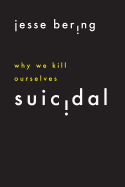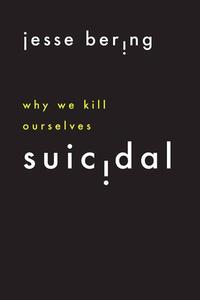
 Suicide is one of the toughest subjects to write about, and psychologist Jesse Bering (The Belief Instinct) does it with candor, scientific integrity and genuine empathy in Suicidal: Why We Kill Ourselves.
Suicide is one of the toughest subjects to write about, and psychologist Jesse Bering (The Belief Instinct) does it with candor, scientific integrity and genuine empathy in Suicidal: Why We Kill Ourselves.The book is part memoir: Bering writes about his own demons and suicidal tendencies, exacerbated by a depressive disorder and problems in his professional life. For a gay man, these feelings are nothing new; he experienced them in his youth when he was closeted. In this way, Bering frames his book in starkly personal terms--as someone deeply invested in understanding suicide and preventing tragedy. The book itself is a testament to the human spirit. Researching and writing the book, he says, was a way to combat suicidal ideation and give his own life a renewed sense of purpose.
What Bering discovered along the way is broken up into several chapters. He traces the history of suicide research, delving into the unsettled science. From an evolutionary standpoint, he finds that while other species are known to sacrifice themselves for the greater good, humans stand out as the only species who use suicide to escape emotional agony. He connects this to humans' social nature and ability to project negatively into the future. Besides scientific research, the book draws on existentialist thinkers and writers and includes substantial anecdotes from kin of suicide victims. The latter stories are treated carefully as Bering homes in on the ultimate question of why. Why do people kill themselves knowing it will cause pain to others? In later chapters, Bering investigates the question from a moral stand point, delving into religious beliefs and the ethics of suicide. The discussion is nothing less than compelling, and to his credit, Bering, an atheist, resists moralizing while considering the moral complexities of the act.
The most important chapter in the book, "Hacking the Suicidal Mind," is grounded firmly in psychology and presents the distinct psychological stages that lead to suicide, including falling short of expectations and disinhibition. These stages are delineated clearly and can be used practically in suicide prevention, helping readers "recognize distinct landmarks in your own suicidal mind or that of someone you love."
Throughout Suicidal, Bering emphasizes the human need to connect with others. Even one person is enough to bring someone back from the brink, whether a family member, a stranger, or a friend "who ventures to love us despite us." It's a vital message. And Suicidal is a vital book--informative, engaging and enlightening despite its dark subject matter. --Scott Neuffer, writer, poet, editor of trampset
Shelf Talker: A psychologist mixes memoir and science in this in-depth, comprehensive and painfully personal study of suicide.

